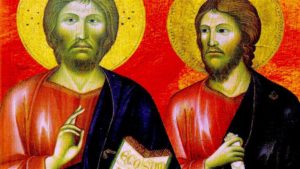Thoughts on Sunday’s Lessons for Sept. 2, 2018
First Reading (Track One): Song of Solomon 2:8-13
To this point in the Pentecost season we have followed the stories of Israel’s Judges and Kings in our Track One first readings. Now we turn for the next couple of months to the Hebrew Bible’s wisdom literature – books of thoughts and advice on wise and proper living. We begin this Sunday with a love poem from the Song of Solomon, a collection of love poems that tradition attributes to King Solomon himself (although they were actually written centuries later). These verses sing of deep love between a woman and a man who has just returned to her after a cold winter; but we can also read it as a metaphor for God’s love for God’s people.
First Reading (Track Two): Deuteronomy 4:1-2, 6-9
Don’t do as we say. Do as we do. We hear this simple wisdom unveiled for us throughout Sunday’s readings. In our Track Two first reading last week, we looked on as an aging Joshua, facing the end of his life, called on the people to recommit to God’s covenant now that they are established in the Promised Land. This week we hear a similar call to renewed commitment to the law and teaching, as told in Moses’ words in Deuteronomy as the people prepare to cross into the Promised Land. By carrying God’s teaching down through the generations, the Israelites will earn the right to live in the land, and they will earn the world’s respect for their wisdom and discernment.
Psalm (Track One): Psalm 45:1-2, 7-10
Sunday’s Psalm portion is framed as a love song, too. A noble song fashioned for a king on the occasion of his royal wedding, it praises the king himself as the fairest of men, from whose lips produce flowing grace. But the narrative promptly turns to praise God, above the king, the Holy One who has anointed and blessed the king with an enduring throne and a scepter of righteousness. God has anointed the king because he loves righteousness and hates iniquity, thus carrying out God’s will and earning God’s blessings on earth.
Psalm (Track Two): Psalm 15
Echoing Moses’ wisdom, the Psalmist – said by tradition in this Psalm to be King David himself – proclaims that those who live blamelessly and with righteousness and truth may earn God’s protection. Be honest, be trustworthy, be fair; protect the innocent. Follow these ways, and abide upon God’s holy hill. Honesty, kindness, and love of neighbor all make a difference. The way we live matters to God.
Second Reading: James 1:17-27
Our second readings for the coming month now turn from Ephesians to the letter of James. Traditionally attributed to James, the brother of Jesus, this letter was actually probably written by a later Jewish Christian late in the first century, perhaps around the same time as Matthew’s Gospel. It was quite possibly an early church pushback against Paul’s theology of salvation by free grace from God, a debate that would resonate 1,500 years later when Martin Luther declared James a “letter of straw,” because its underlying message that faith without works is dead stands agains Luther’s theology of salvation by faith alone. Today’s verses, consistent with Sunday’s other readings, emphasizes the our covenant call to be righteous, to care for widows and orphans in their distress.
Gospel: Mark 7:1-8, 14-15, 21-23
Our six-week foray into Jesus’ extended dissertation on the bread of life in Chapter Six of John’s Gospel has come to its end, and we now return to Mark’s Gospel for the rest of this liturgical year. If you don’t pay attention, though, you might think for a moment that nothing has changed, as we find Jesus again arguing with a crowd of scribes and Pharisees. The law-abiding religious leaders challenged Jesus because they saw his disciples ignoring the strict ritual practice of washing before eating. In response, Jesus quotes the Prophet Isaiah, scorning those who honor God with their lips while their hearts are far away, thoughtlessly following ritual rather than living in the spirit of God’s laws. It is not eating that defiles us, Jesus proclaims, but the sins that come from our mouths and our hearts.
What are “Track 1” and “Track 2”?
During the long green season after Pentecost, there are two tracks (or strands) each week for Old Testament readings. Within each track, there is a Psalm chosen to accompany the particular lesson. The Revised Common Lectionary allows us to make use of either of these tracks, but once a track has been selected, it should be followed through to the end of the Pentecost season, rather than jumping back and forth between the two strands.
For more information from LectionaryPage.net, click here.

